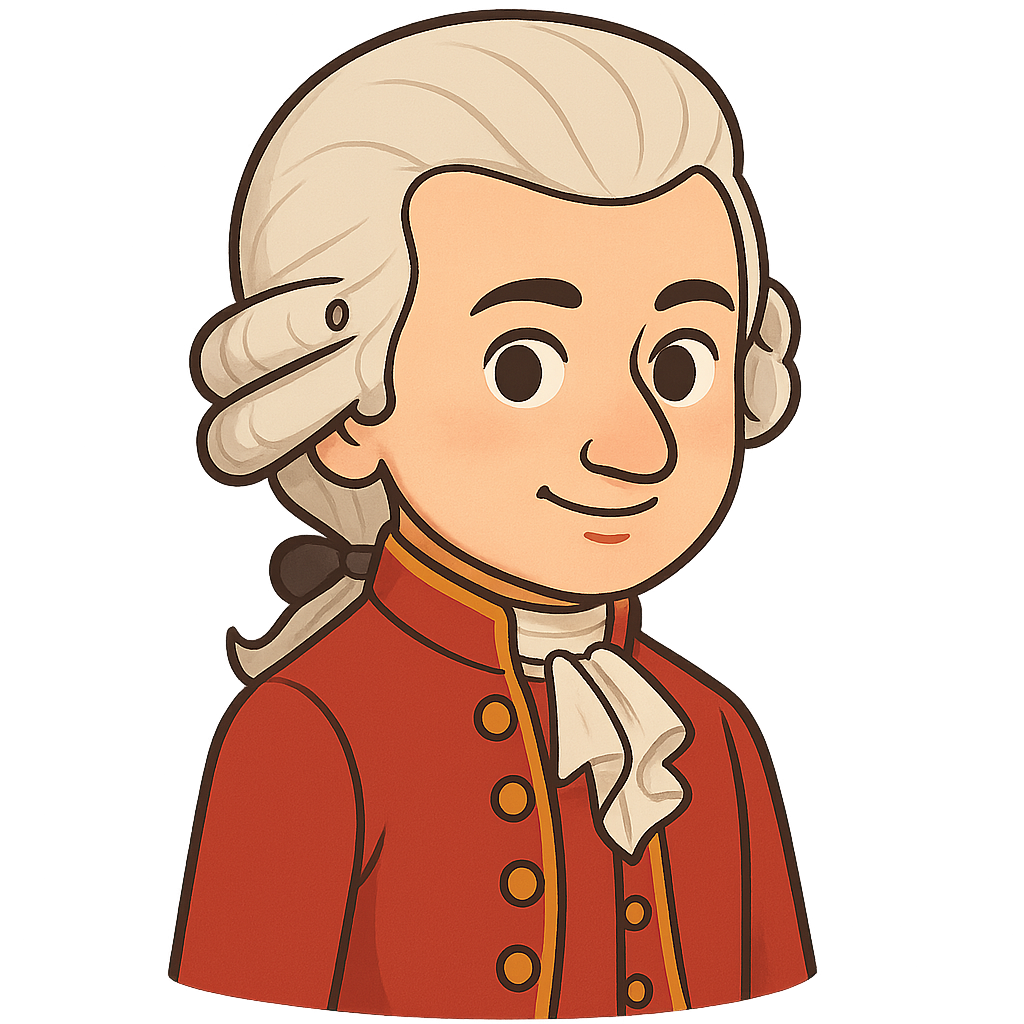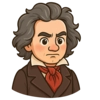Wolfgang Amadeus Mozart
Hello there. My name is Wolfgang Amadeus Mozart, and I want to tell you the story of my life, a life filled with music. I was born on a chilly January day, January 27, 1756, in the beautiful city of Salzburg, Austria. Our home was always filled with melodies, which was no surprise. My father, Leopold, was a well-respected composer and violinist in the court of the Archbishop of Salzburg. My older sister, Maria Anna, whom we all called Nannerl, was a wonderfully gifted keyboard player. It seemed that music was the very air we breathed. Before I could even speak in full sentences, I understood the language of notes. I remember sitting quietly, completely captivated, as my father taught Nannerl her harpsichord lessons. The sounds filled my head, and I could feel the harmonies fitting together like puzzle pieces. When she was finished, I would climb onto the bench myself, my small fingers searching for the chords I had just heard. It wasn't long before I was not just repeating her music, but creating my own. In 1761, when I was only five years old, I composed my first short pieces, an Andante and an Allegro. My father wrote them down for me, his eyes wide with a mixture of pride and astonishment. For me, it wasn't a chore or a lesson; it was simply expressing the sounds that were constantly swirling in my mind. Composing music felt as natural and necessary as breathing.
My father soon realized that my and Nannerl's talents were too extraordinary to keep hidden in Salzburg. So, in 1763, when I was just seven years old, our family packed our bags and began a grand tour of Europe. For years, our home was a bumpy carriage, rattling along dusty roads from one great city to the next. We traveled to Munich, Paris, London, and Vienna, performing in the magnificent courts of kings, queens, and emperors. I remember the thrill of playing for Empress Maria Theresa in her grand palace in Vienna. To make the performances even more spectacular, my father would have me perform little tricks, like playing the harpsichord perfectly with a cloth covering the keys so I couldn't see them. The audiences would gasp and applaud, calling me a “wunderkind,” or wonder child. In London, in 1764, I had the great fortune of meeting Johann Christian Bach, a son of the legendary Johann Sebastian Bach. He was kind and brilliant, and listening to his music filled me with new ideas. We even played duets together, our fingers flying across the keys. This life was a whirlwind of adventure and applause, but it was also incredibly demanding. We were rarely in one place for long, and the constant travel was exhausting. There were times I missed just being a boy, running freely in a field instead of standing on a stage. I was always on display, a little prodigy meant to amaze the world.
As I grew from a boy into a young man, the desire for my own life, my own path, grew stronger. Back in Salzburg, I worked for the Archbishop Colloredo, but I felt trapped, like a bird in a cage. He did not appreciate my ambition or my style of music, and I knew I couldn't flourish under his strict control. So, in 1781, I made the most daring decision of my life: I resigned from my position and moved to Vienna, the musical heart of the world, to make my way as a freelance artist. It was a huge risk, but I was determined to be the master of my own destiny. Vienna was a whirlwind of creativity and opportunity. It was there that I met and fell in love with the wonderful Constanze Weber, and we married in 1782. Our life together was filled with both immense joy and constant worry. I worked tirelessly, taking on piano students, performing in concerts, and composing. This period became my most productive. My imagination soared, and I poured my soul into my operas. I brought stories to life with music in 'The Marriage of Figaro' in 1786, created the dark and dramatic 'Don Giovanni' in 1787, and in 1791, I composed 'The Magic Flute,' a fairy tale opera filled with wonder and humanity. I loved creating characters with my music, giving them feelings and voices that an audience could connect with. But even with my successes, financial security was always just out of reach. We often struggled to pay our bills, a constant source of stress. Yet, through it all, the music never stopped flowing from me.
My final years were a flurry of composition. Even as my health began to fail, my mind was sharper than ever. In 1791, a mysterious stranger commissioned me to write a Requiem, a mass for the dead. I threw myself into the work, feeling a deep, personal connection to its powerful and somber themes. It felt as though I was writing it for myself. I worked on it feverishly, even from my sickbed, but I would not live to complete it. My life came to an end on December 5, 1791. I was only thirty-five years old. Some might see my story as a tragedy because it ended so soon, but I do not. I believe my purpose was to fill the world with the melodies that filled my soul, and I did just that. Though my time on Earth was brief, my music achieved a kind of immortality. It has lived on for centuries, traveling far beyond the grand courts of Europe. It continues to be played in concert halls, homes, and even in movies, bringing people feelings of joy, sorrow, passion, and peace. My greatest hope was that my music would speak directly to the human heart, and in that, I believe I succeeded. My notes are my legacy, a gift of my spirit to the world, forever.
Activities
Take a Quiz
Test what you learned with a fun quiz!
Get creative with colors!
Print a coloring book page of this topic.















